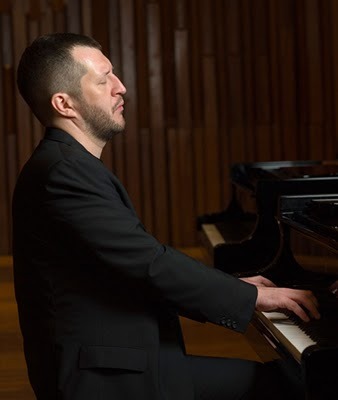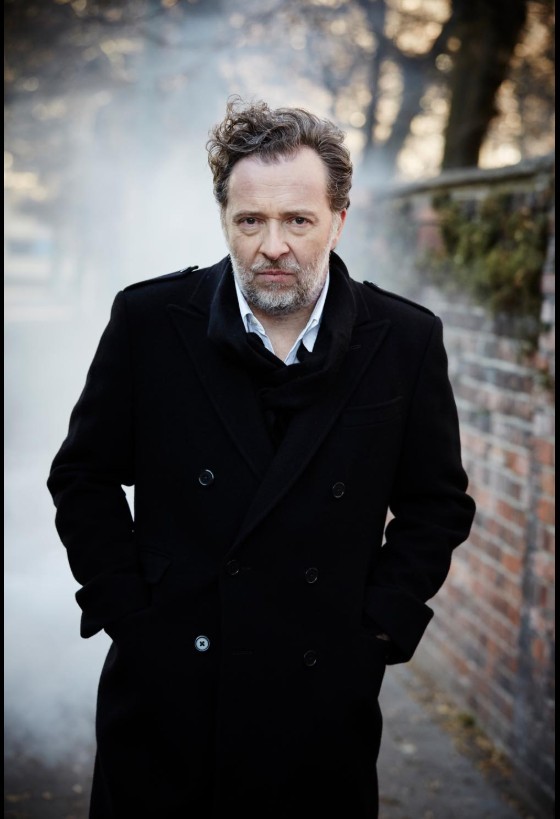
Thomas Adès
The atmosphere was electric. A mix of current Guildhall students, teachers, professors, alumni, critics and music lovers all piled in to the intimate Milton Court concert hall – Guildhall’s new music and drama venue. To celebrate the opening of this building, the School organised an alumni recital series, featuring the most illustrious performers the school has produced, including Anne Sofie von Otter and Toby Spence. Tonight, it was the turn of Thomas Adès, one of the UK’s (and perhaps the world’s) most distinguished living composers. With Adès on piano, he was joined by fellow alumni Anthony Marwood (violin), Louise Hopkins (cello), and Matthew Hunt (clarinet) to perform a mix of solo and chamber works – and it didn’t disappoint.
Benjamin Britten
Suite for Violin and Piano, Op. 6
The concert opened with Marwood and Adès confidently striding out on stage to perform Britten’s Suite for Violin and Piano. The joy of experiencing these two performers interpret a work such as this is that it was simply an enjoyable, inspiring experience. As musicians, we often sit on edge in a concert; knowing more intimately than anyone else the technical difficulties that the performers have to overcome makes us nervous on their behalf. It’s a real feat, then, when a performance is capable of making us forget about these difficulties. Yes, we were aware that the Britten is one of the most challenging violin works of the last century, but both performers entered so much into the spirit of things that we were made to enjoy it.
After the striking introduction, the piece opened with a light, dancing, filigree movement, with both instruments leaping gracefully around the their entire ranges. This was followed by a moto perpetuo, a non-stop flurry of scurrying musical ideas. The lullaby that followed was the tender core of the work; both performers totally drew the audience in and created an incredibly intimate atmosphere.
The finale was a riotous foot-stomper. You got the flavour of the Viennese waltz that Britten was trying to evoke, but as ever, he managed to put his twist on it, in the way in which the violin and piano interacted were unmistakably his own.
Right from the comical, sparse opening, through the intimate slow movement and into the foot-stomping finale, it really was a performance that no-one in the hall was likely to forget soon.
And that was just the first piece of the evening. Next up was Gerald Barry’s Low, performed by clarinettist Matthew Hunt. The non-stop frenzy of notes of Low was mirrored by the visual aspect of Hunt’s four music stands stridently straddling the stage (there were no opportunities for page turns in this crazy showpiece). From start to finish the piece progressed relentlessly, giving Hunt countless opportunities to showcase his outstanding technique.
To close the first half, Louise Hopkins took to the stage to perform a work of Adès’s, Lieux retrouvés for cello and piano. Whereas the Britten was often carefree and humorous, Lieux retrouvés had its fair share of gritty moments. Here we were fully aware of the technical difficulties with which Adès presents the cello, but this was no bad thing – Hopkins successfully navigated all the tricky corners, and the performers’ physical exertion added to the overall quality of the performance.
Thomas Adès
Catch, Op. 4
Stravinsky’s suite from The Soldier’s Tale for violin, clarinet and piano opened the second half. All three performers confidently evoked piece’s story, right from the simplistic Violon du Soldat to the hellish Danse du Diable. Hopkins joined the trio for Adès’s Catch, an incredibly theatrical work in which musical ideas are literally thrown around, and the clarinettist begins offstage, marching around the hall before finally joining the trio in harmony at the end of the piece, leading on to Adès’s Court Studies from his opera The Tempest. Adès’s ear for sounds and textures really shone through in this piece; often a single musical line was passed through all four instruments, and the performers ensured that these lines were clear, well-articulated, and incredibly expressive.
It really was a night to remember. What was most striking about this concert is the amount to which every performer totally committed to every note. There was never a moment where the excitement slackened, and the evening was both an inspiration to members of the public and current students at the School, and a celebration of the highest standards of chamber music currently happening in this country.


